
Consumer & Sustainability Perceptions 2024: UK & Northern Europe
Our Consumer & Sustainability Perceptions 2024 report is part of a series of reports that explores how consumers view beauty and sustainability around the globe.
This report focuses on the UK market and Scandinavian countries (Norway, Sweden, Finland and Denmark). It includes consumer data and insights as well as highlights local beauty brands that are innovating in the beauty sustainability space.
Our Consumer & Sustainability Perceptions 2024 report is released in eight parts covering different regions around the world:
- Latin America - HERE
- Asia-Pacific - HERE + Malaysia - HERE
- UK & Northern Europe (below article) HERE
- Southern Europe - HERE
- Western Europe - coming soon
- Central & Eastern Europe - coming soon
- North America - coming soon
- Middle East & Africa - coming soon
Sustainable Initiatives & Priorities: Snapshot

Regions: UK & Northern Europe
Five key markets will be covered in this report:
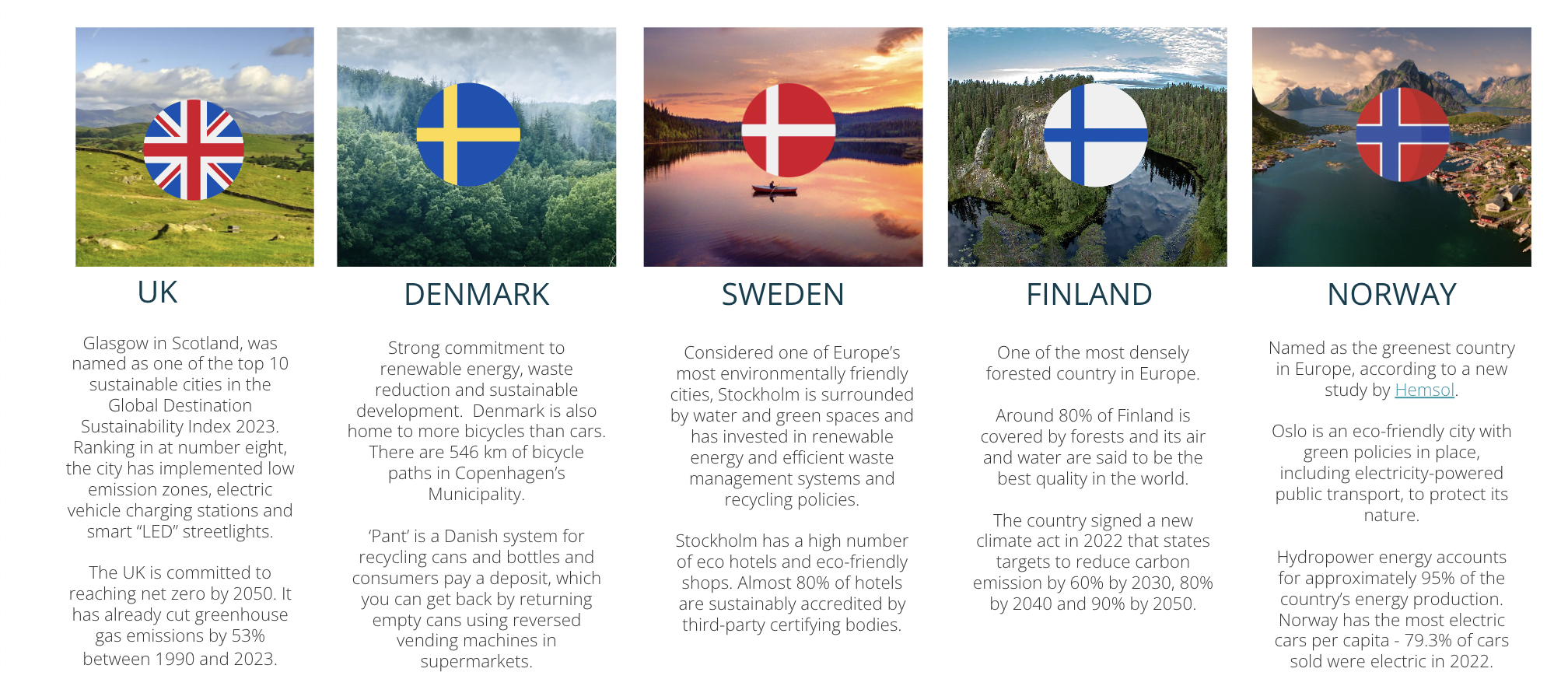
UK
Market Insights

Economy
- UK consumers are tightening their purses due to higher cost of living and inflation. 46% of adults in the UK said that they would buy fewer items of skincare and makeup (eMarketer).
- One in five people in the UK are worried about being able to afford skincare products due to the cost of living crisis, while one in three have sacrificed or have considered sacrificing their ethics and values when buying essential skincare items (UpCircle Beauty).
50% of consumers polled by Aviva said that dealing with the cost of living is a greater priority than making changes to reduce their environmental impact
Climate & Environment
- 77% of UK consumers think climate change is a serious global threat (Ipsos Political Monitor 2023).
- UK consumers are worried about climate change with 80% of people saying that they are worried about it. 73% of people think the world is experiencing a climate change emergency.
Beauty
95% of UK-based women would purchase ‘imperfect’ beauty items with aesthetic imperfections or missing boxes.
- UK consumers are willing to buy beauty products that come without a box or slightly damaged outer packaging but safety and hygiene remain a key priority (Boop).
- Over 70% of UK consumers are worried about the effects of air pollution on their skin. Men are interested in anti-pollution products, with 43% saying that they have started to buy anti-pollution skin care (Westfield’s How We Shop platform).
- Only a fifth of the men surveyed buy plastic-free bathroom products. Research commissioned by men’s grooming label Brother Earth found a third of men (4.9 million) feel overwhelmed by the concept of sustainability and don’t trust the claims of sustainable products.
- According toAttest’s UK Beauty & Grooming Report 2022, the top three marketing terms that UK consumers said was most appealing to them were ‘natural ingredients’ (39%), ‘free from harmful chemicals’ (37%), ‘cruelty-free’ (36%).
Consumer Sustainability Perceptions

- In Attest’s UK Beauty & Grooming Report 2022, which surveyed 1,000 UK consumers, revealed that people are far more likely to be looking for brands that promote “natural beauty” rather than “sustainable beauty”. 45% of consumers take a brand’s use of natural or clean ingredients into consideration when buying beauty products compared to only 31% that said they take a brand’s environmental credentials into account.
Although 91% of UK consumers consider sustainability important, 83% want more transparency according to data from Provenance’s Skin Deep Beauty Report 2022.
- There is a high distrust in claims. Only 16% of British beauty shoppers think beauty brands’ sustainability claims are “very trustworthy”.
- 61% of British consumers would stop buying a brand if they disagreed with its values, according to a survey by product intelligence business Vypr.
- 47% of UK consumers say that they don’t trust companies to be honest about their environmental impact (Mintel Global Outlook on Sustainability 2023).
- According to Mintel’s UK Sustainability in Beauty & Personal Care Market Report 2022, 45% of UK consumers would be interested in a reward system for returning packaging, while 38% of beauty shoppers would be interested in refill pouches to decant into their empty pouches.
The latest survey by Nivea found that one in three (33%) UK consumers said that confusion about which products can be recycled stops them from recycling their bathroom products
- One in four (44%) said they are “afraid” of putting the wrong products in the recycling bin (Nivea).
- 77% of consumers in the UK have heard of refillable beauty, know what it means and have used or are interested in using a refill concept.
Sustainable Local Beauty Brands
Elemis
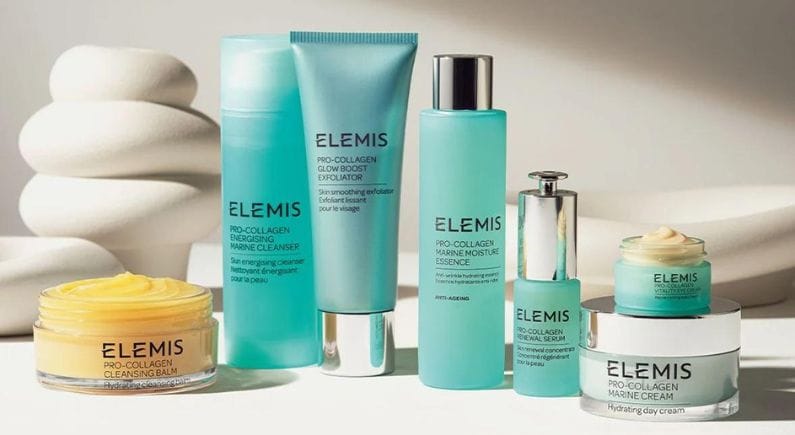
B corp certified brand is committed to creating smarter formulations and eco-friendly packaging to minimise the impact on the planet. Elemis has partnered with natural materials company Xampla to develop plastic-free sample sachets made from leftover plant waste.
Haeckels
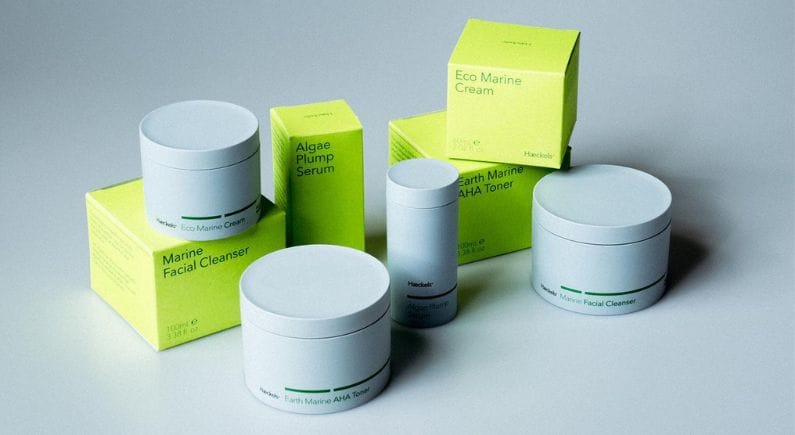
Margate-based natural beauty company focuses on local sustainable sourcing, production methods and packaging. Haeckels’ high performance skincare line uses biotech to re-create nature-identical ingredients.
UpCircle
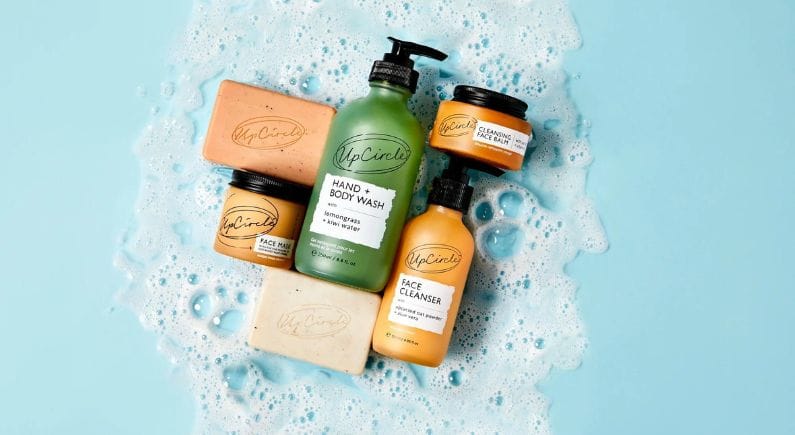
UpCircle products are formulated with waste by-products including coffee grounds, fruit waters, chai spices and more. The B corp certified brand offers a range of products from fragrances to hair and body care. The return, refill and reuse scheme encourage consumers to send back empty bottles for reuse.
Lush
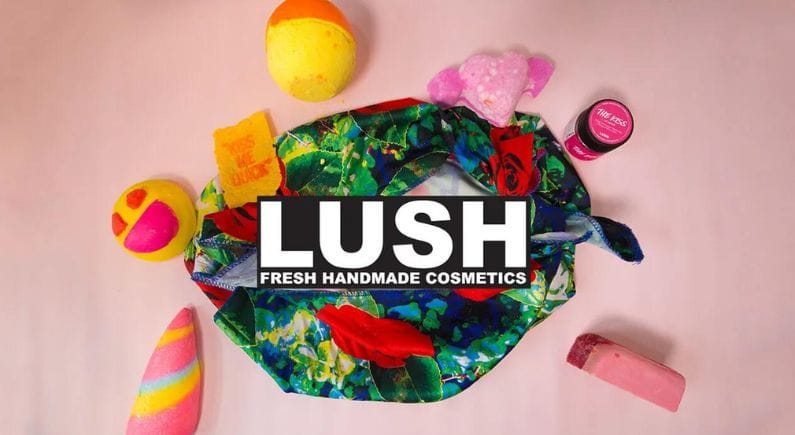
Founded in 1995, Lush offers ethical and handmade products, famous for their naked plastic-free bath bombs, shower jellies and solid shampoo bars.
Marketing & Retail Insights
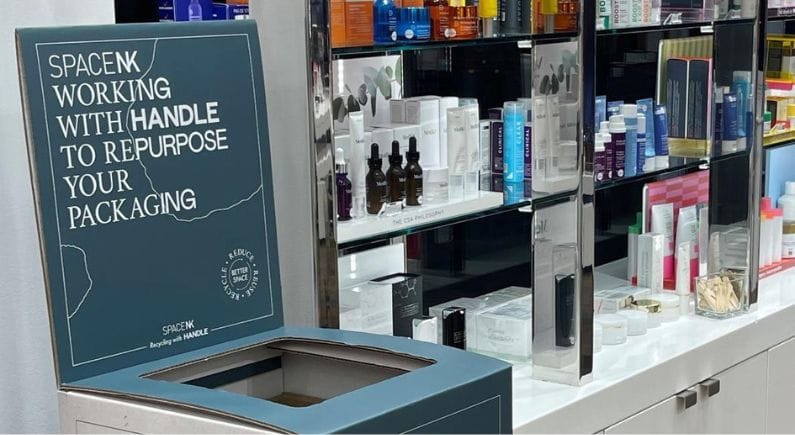
- In-store recycling schemes are growing in popularity on the UK high street. Beauty retailers such as Boots, Harrods, Marks & Spencer and Space NK all offer initiatives that enable customers to drop off cosmetic packaging into recycling boxes.
- Harrods’ H Beauty expanded its cosmetics recycling schemes to five stores in January 2024 following the successful trial at the Milton Keynes store where 200kg of beauty packaging and products were diverted from landfills.
- Marks & Spencer launched an in-store beauty recycling scheme in summer 2023 where shoppers can return their empty packaging to more than 40 M&S stores across the UK. The Perfume Shop saw over 6,800 perfume bottles returned to stores through its return and repurpose scheme.
- Independent beauty retailer Blomma Beauty offers UpCircle Beauty refills in stores where shoppers can refill products including shampoo, face oil, moisturiser, eye cream, night cream and cleansing milk.
- Reposit is on a mission to ‘accelerate the transition to reuse’ with its re-use programme. Beauty Kitchen has teamed up with REPOSIT to reuse its packaging. After consumers finish using the product, they can return the empty packaging back to Beauty Kitchen by post or arrange for a free home collection. Returned packaging will earn customers a discount off their next purchase.
- Online retailer Cult Beauty provides shoppers with greater transparency through its partnership with transparency tech-platform Provenance using blockchain technology to digitally verify product and supply chain information using Proof Points.
Scandinavia Countries

Economy
- According to the World Bank, all Nordic countries are among the top 20 countries in the world in terms of renewable energy production per capita.
- In Norway, hydrapower energy accounts for approximately 95% of the country’s energy production. This country has the most electric cars per capita. In 2022, Norway set a record – 79.3% of cars sold were electric.
In Sweden, cost of living is impacting people’s sustainable choices. 38% of consumers said they would reduce spending on eco-friendly beauty products to accommodate tight budgets
Climate & Environment
- Considered one of Europe’s most environmentally friendly cities, Sweden has one of the highest number of eco-hotels worldwide.
- Norway was named as the greenest country in Europe according to a new study by Hemsol. Oslo is an eco-friendly city with green policies in place to protect its nature and electricity-powered public transport.

Culture
- Reuse and recycle: from choosing reusable coffee cups in shops to offering items for reuse, and delivering materials to recycling centre, reuse and recycling are popular in all Nordic regions. In Sweden, Finland and Denmark, nearly 7 out of 10 consumers have chosen a reusable cup in the past 12 months (YouGov). 6 out of 10 consumers in Norway have used a reusable coffee cup.
Consumers embrace a minimalist lifestyle or ‘lagom” meaning ‘moderate’ and their beauty routines reflect this
Beauty
- According to Statista, organic and sustainable beauty products are on the rise in Sweden, driven by the country’s strong focus on environmental consciousness and ethical consumerism.
- Waterless beauty products are gaining traction as consumers want to reduce the use of natural resources.
- Consumers look for natural and locally sourced ingredients in their beauty products. Maintaining skin health is key, with consumers using only minimal skincare products.
- High interest in biotech ingredients as people look for safer sustainable products.
Consumer Sustainability Perceptions

There is high emphasis on sustainability. 58% of consumers surveyed in the Nordic countries said that sustainability aspects are important to them when purchasing a product
- According to BCG’s Nordic Consumer Sentiment 2022 survey, which surveyed 4,000 consumers across Sweden, Norway, Denmark and Finland, consumers in Sweden and Finland are more frequent buyers of sustainable products, with 34% and 40% consumers, respectively, reporting that many to most of their purchases are sustainable, compared with 25% and 19% in Norway and Denmark.
- Only 27% of consumers surveyed in the Nordic countries are willing to pay a premium for sustainable cosmetics, skincare, and hygiene products. Danish (31%) and Finnish (28%) consumers have a higher willingness to pay a sustainability premium for cosmetics, skincare, and hygiene compared to Norway (26%) and Sweden (23%).
Consumers in Finland (71%) and Denmark (70%) are more optimistic about the collective ability to create a sustainable future compared to Sweden (54%) and Norway (58%), according to YouGov’s Nordic Consumer Perceptions on the Circular Economy 2023 Report
- Awareness and knowledge of the concept of circular economy is highest in Finland (YouGov). 48% of consumers in Finland said that they have heard of the circular economy and know what it is compared to 26% in Sweden, 24% in Norway and 16% in Denmark.
- When it comes to shopping for sustainable products, 3 out of 10 consumers in Sweden, Norway, and Denmark said that they feel they do not have enough information to understand the sustainability of a given product (YouGov). Meanwhile in Finland, more than 4 out of 10 consumers feel they have enough information to understand the sustainability of a product.
- According to a 2023 report by Nordregio, which surveyed adults in five Nordic countries, including Denmark, Finland, Iceland, Norway and Sweden, it found that 71% of consumers agree that climate change is a serious or very serious problem and half of consumers (49%) agree that more public resources should be spent to fight it.
Sustainable Local Beauty Brands
Henua (Finland)

Henua is a premium natural skincare rooted in Nordic simplicity. Made in small batches, the products contain only organic and potent active ingredients, formulated without water and replaced with birch sap.
Rua (Norway)

Rua is a minimalist skincare line featuring three products made with wild harvested, organically grown and 100% plant-based ingredients. Over 90% of the ingredients and packaging are sourced from Europe to reduce carbon footprint.
Nuori (Denmark)

Danish beauty company Nuori that uses 100% natural origin and sustainable sourced ingredients that have clinically proven benefits. The freshly blended formulas are made in small batches every 10 to 12 weeks.
Bjork & Berries (Sweden)

Bjork & Berries' fragrance and cosmetics line is inspired by Sweden's natural landscape. The eco-luxury brand uses responsibly sourced local ingredients from nature that have been passed through generations.
Marketing & Retail Insights
- Danish beauty brand Bodyologist focuses on providing consumers with full ingredient transparency by documenting the expected effects and results of each product formulation. Similarly, Swedish brand Verso Skincare breaks down all the ingredients they use with easy to understand descriptions and on their website by listing all the materials used in their packaging with details on how to recycle it.
- Woods of Copenhagen uses social channels to highlight ways to recycle empty packaging.
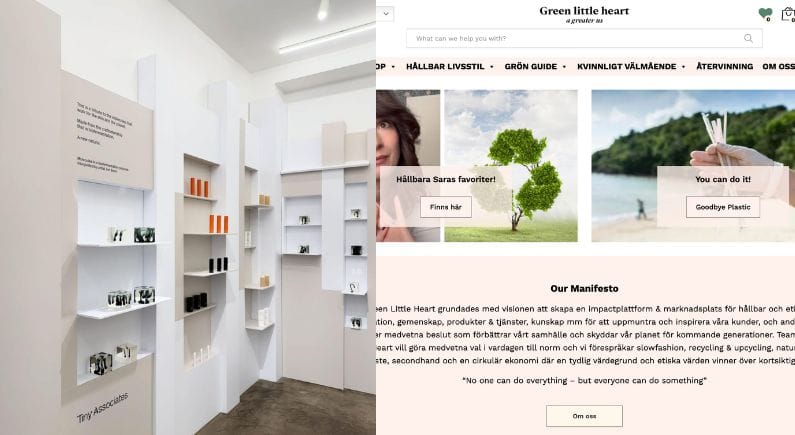
- Green Little Heart is a sustainable online marketplace hailing from Sweden that offers a range of green, sustainable and conscious brands as well as sharing knowledge and inspiring consumers to make more conscious shopping choices.
- Stockholm-based skin care brand Tiny Associates created a biofermentation-inspired artwork installation for Dover Street Parfums Market to highlight the bio-based molecules featured in the brand’s products and educate consumers about biotechnology.
Action Points
- Confusion over recycling: consumers are confused on what can and can’t be recycled. Beauty brands must make it easier for consumers to recycle their packaging or provide clearer information and education.
- More incentives for refills: refills are gaining mainstream traction in the UK but in-store retailers need to entice consumers to bring back empty bottles and reuse them with incentives and more immersive experiences. Convenience is key, so make it easy for consumers to bring empty packaging back.
- A need for greater transparency: consumers want more transparent and honest information from brands they buy from. Beauty companies will need to gain greater trust by delivering informative and educational content on their sustainable practices, products and supply chain. Look to brands like Bodyologist and Verso who are championing greater ingredient transparency on their website.
- Opportunity for beauty packaging reuse: consumers are more likely to use a reusable coffee cup in coffee shops in Nordic countries, highlighting an opportunity for beauty stores to also encourage a similar approach via refillable options where shoppers can bring back tubs, jars and bottles for refill.
- A skinimalism approach to beauty: Nordic beauty consumers prefer a minimalist approach to their beauty routines opting for a streamlined skincare ritual that focuses on the key essentials to maintain skin health but also reducing waste.
- Waterless beauty product a growing trend: consumers in this region are increasingly seeking more sustainable alternatives and beauty products without water is gaining traction as consumers become more educated about ingredients.
- A biotech boom: interest in biotechnology is growing in these countries as consumers embrace more safer and sustainable alternatives.

